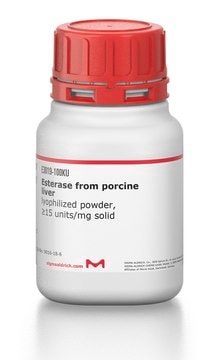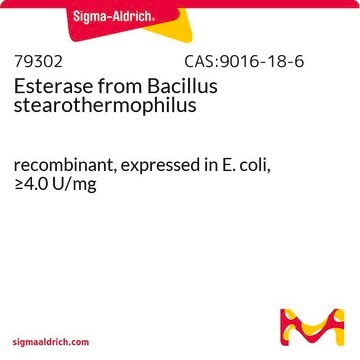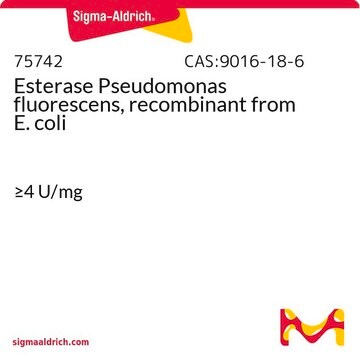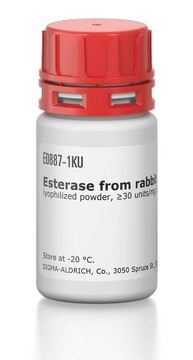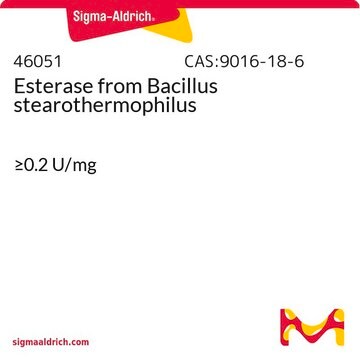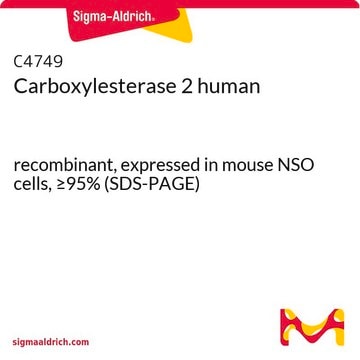96667
Esterase from Bacillus subtilis
recombinant, expressed in E. coli, ≥10 U/mg
Sinónimos:
Carboxylesterase
Iniciar sesiónpara Ver la Fijación de precios por contrato y de la organización
About This Item
Productos recomendados
recombinant
expressed in E. coli
Quality Level
form
crystalline
crystals
powder or flakes
specific activity
≥10 U/mg
storage temp.
−20°C
¿Está buscando productos similares? Visita Guía de comparación de productos
General description
Esterase belongs to the hydrolase superfamily of enzymes.This recombinant esterase contains a C-terminal histidine tag.
Application
Esterase, from Bacillus subtilis, may be used in protein engineering research as well as to study the kinetic resolution of acetates of arylaliphatic tertiary alcohols. Product 96667 is recombinant and expressed in E. Coli (≥10 U/mg).
Biochem/physiol Actions
An esterase is a hydrolase that splits esters into acids and alcohols.
Esterase participates in the stereospecific hydrolysis and production of esters. Esterases, that are obtained from cultured bacteria and fungi has several industrial applications.
Packaging
Bottomless glass bottle. Contents are inside inserted fused cone.
Unit Definition
1 U corresponds to the amount of enzyme which converts 1 μmol 4-nitrophenyl-L-acetate per minute at pH 7.5 and 30°C.
signalword
Danger
hcodes
pcodes
Hazard Classifications
Resp. Sens. 1
Storage Class
11 - Combustible Solids
wgk_germany
WGK 1
flash_point_f
Not applicable
flash_point_c
Not applicable
Certificados de análisis (COA)
Busque Certificados de análisis (COA) introduciendo el número de lote del producto. Los números de lote se encuentran en la etiqueta del producto después de las palabras «Lot» o «Batch»
¿Ya tiene este producto?
Encuentre la documentación para los productos que ha comprado recientemente en la Biblioteca de documentos.
High-Resolution Fractionation Processes
Separation Science and Technology, 1, 61-99 (1998)
Birgit Heinze et al.
Protein engineering, design & selection : PEDS, 20(3), 125-131 (2007-02-21)
Enzyme-catalyzed kinetic resolutions of secondary alcohols are a standard procedure today and several lipases and esterases have been described to show high activity and enantioselectivity. In contrast, tertiary alcohols and their esters are accepted only by a few biocatalysts. Only
Jessica Lusty Beech et al.
RSC advances, 12(13), 8119-8130 (2022-04-16)
Esterase enzymes catalyze diverse hydrolysis reactions with important biological, commercial, and biotechnological applications. For the improvement of these biocatalysts, there is a need for widely accessible, inexpensive, and adaptable activity screening assays that identify enzymes with particular substrate specificities. Natural
Soil-based gene discovery: a new technology to accelerate and broaden biocatalytic applications
Gray K A, et al.
Advances in Applied Microbiology, 52, 1-28 (2003)
New citation. Highly Enantioselective Synthesis of Arylaliphatic Tertiary Alcohols using Mutants of an Esterase from Bacillus subtilis
Robert Kourist, Sebastian Bartsch, et al.
Advanced Synthesis & Catalysis, 349, 1393-1398 (2007)
Nuestro equipo de científicos tiene experiencia en todas las áreas de investigación: Ciencias de la vida, Ciencia de los materiales, Síntesis química, Cromatografía, Analítica y muchas otras.
Póngase en contacto con el Servicio técnico